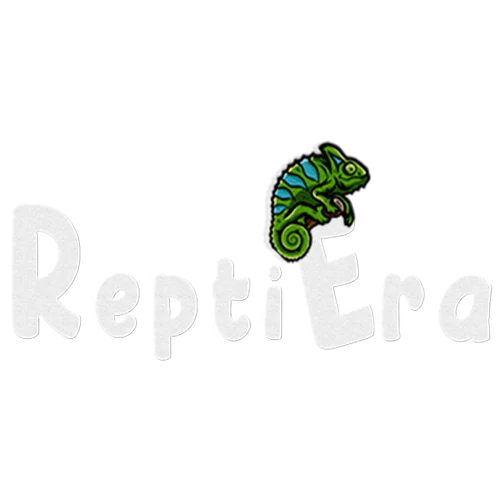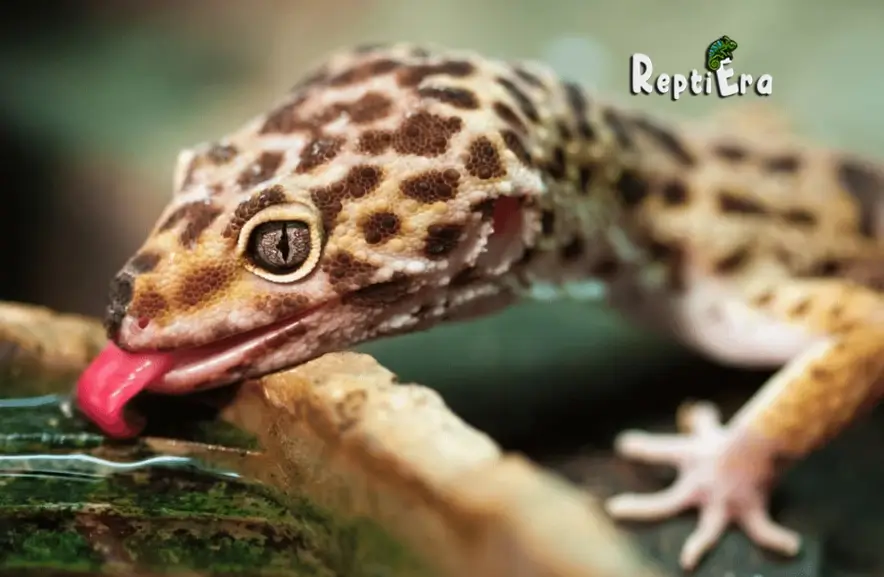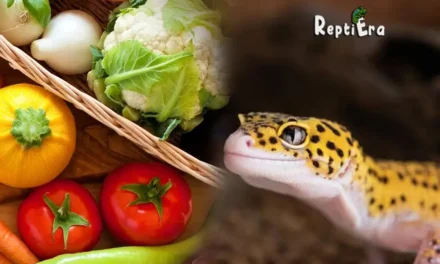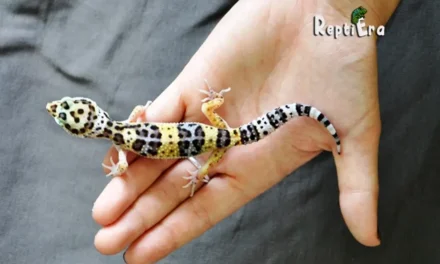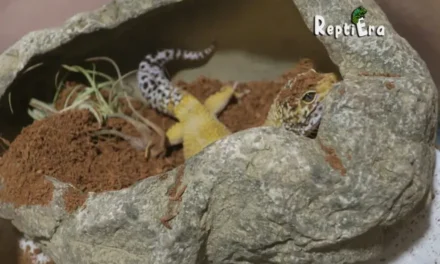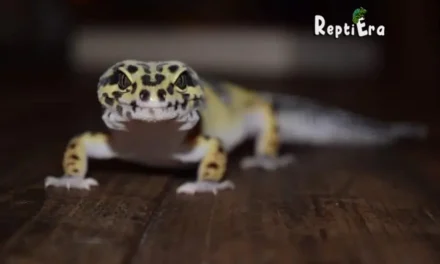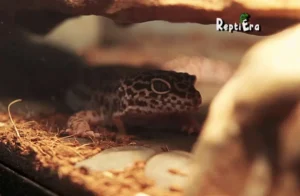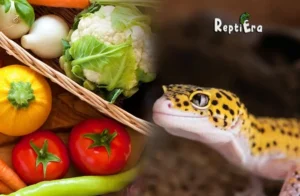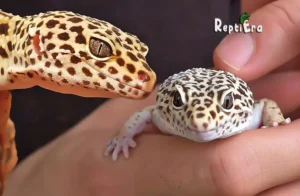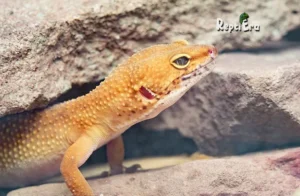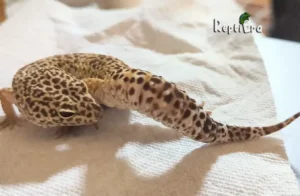When your Leo is out in its habitat, exploring and hanging out, you might notice it crawl onto your hand and lick you. If you’ve ever felt weirded out or wondered why your leopard gecko does this, it’s simply their way of getting acquainted with their surroundings. These fascinating creatures have a special Jacobson’s Organ, also known as the vomeronasal organ, located on the roof of their mouths.
This organ helps them to taste and sense their environment, determining if an object is alive or just part of their surroundings. This licking behaviour is their unique method of understanding the world around them, giving them vital information about where they are and who is with them. It’s a natural, instinctive behaviour that helps them navigate their world more effectively.
Why Does My Leopard Gecko Lick Me?
Typically when a gecko or lizard licks you, they’re smelling you, much like a snake, or a dog greeting someone/something. They use their tongues to explore their surroundings. Many times if you poke their nose or mouth, they’ll lick you because they think, “Woah, there’s suddenly something in front of me
Table of Contents
What Does It Mean When Your Leopard Gecko Licks You?
When you observe the licking behaviour or tongue flicking of leopard geckos, it’s a world apart from chameleons using their long tongues to propel forward at a fast rate to catch prey at a distance. Unlike chameleons, leopard geckos use their tongues primarily for smelling and tasting their environment and surroundings.
This behaviour is not just about hunting or pursuing a mate, but also about hiding or breeding strategies. As a Leo owner, you might notice this activity more when they are flicking their tongue in the air and then bringing it back to their mouths. This is how they understand their world.
They possess a Jacobson’s Organ, or vomeronasal organ, which helps them decode the particles and messages from any surface. These nanoscopic particles are collected through an opening in the upper part of their mouth, where this sensory organ transmits signals through nerves to the brain, allowing them to navigate and interact with their world uniquely.
What Else Could Licking Behavior Indicate?
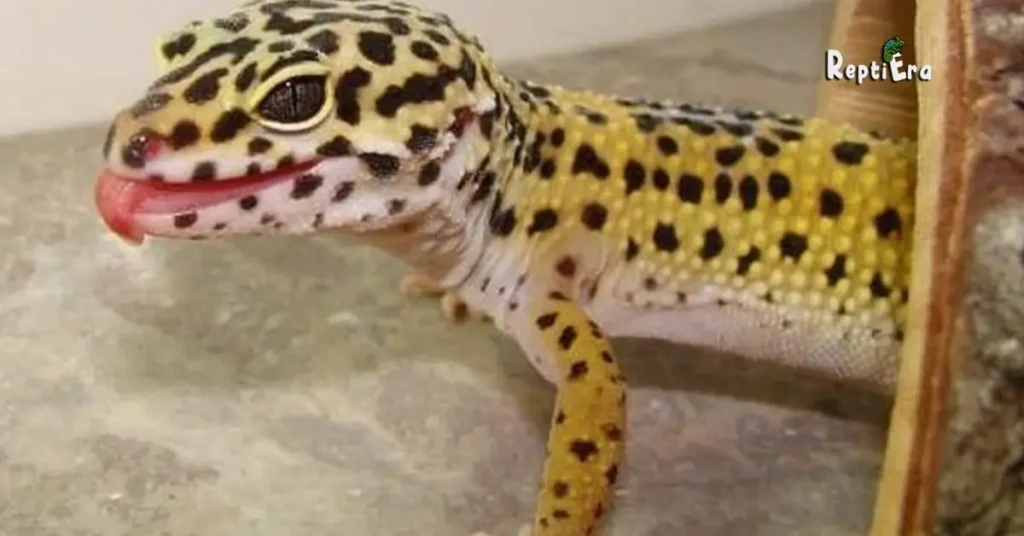
As a leopard gecko owner, I’ve observed their licking habits closely and learned that these actions can indicate more than just curiosity or affection. Licking is a way for them to interact with their environment and us. However, it’s crucial to monitor this behaviour as it can sometimes signal underlying issues.
For instance, if the licking becomes excessive or is accompanied by other unusual behaviours, it might potentially point towards a health concern. Being aware of these nuances allows us to act quickly and respond with the proper treatment if required. This vigilance ensures that our geckos receive the care they require, maintaining their well-being.
Mouth Licking
In my experience with leopard geckos, I’ve noticed a peculiar behaviour where they frequently lick their mouths, which can open substantially wide. This often happens when they lick their keepers’ fingers or during feeding. If a gecko is not able to hold its food properly or shows the difficulty in mouth movements, it might be an experienced keeper’s cue to check for more severe issues.
A weak jaw or a soft, pulpy feeling in the jaw, reminiscent of a sponge-like texture upon examination, could indicate calcium deficiency or MBD (Metabolic Bone Disease). These symptoms should raise concern as they require immediate attention. Understanding and identifying these signs early on can help in determining the best course of action for the health and well-being of our beloved pets.
When Leopard geckos exhibit mouth licking, it could be a sign of a severe calcium deficiency leading to metabolic bone disease, which causes serious health results like bone deformities and a weak jaw. This condition is often incurable, but with proper treatment, it’s possible to prevent further damage.
Tip: To support their health, it’s crucial to regularly include a calcium supplement in your Leo’s diet. Supplements for reptiles usually come in powder form and can be lightly coated on feeder insects during feeding. This preventative measure ensures the health and vitality of your gecko, mitigating risks associated with calcium deficiency.
Lip Licking
Lip licking in leopard geckos is often more than a simple quirk; it can be an indication of a serious illness. When a leopard gecko frequently licks its lips, it might suggest that the lizard is suffering from health issues, such as abscesses or mouth rot. Common signs to watch for include redness, sores in the mouth, and sometimes even visible dead tissue or pus. This condition can be extremely painful for the gecko, leading it to refuse to eat.
The cause of these symptoms can often be traced back to small cuts in the mouth or food stuck in their teeth. If these conditions are untreated, they can become fatal. Therefore, it requires prompt veterinary care. The treatment typically involves cleaning the affected area with an antiseptic and, in severe cases, may even require surgery to remove necrotic tissue. During the recovery period, a liquid diet and nutritional supplements are essential to ensure the gecko regains its health and strength.
Related Post: WHY DO LEOPARD GECKOS LICK THEIR LIPS
Eye Licking
Eye licking in leopard geckos is often misunderstood, but it’s usually not a cause for concern. For Leos, it’s normal behaviour. These reptiles don’t produce tears like humans, so they lick their eyes to keep them moist and clean. This action helps to remove any debris that may get stuck in the eye. However, if you notice signs like crusted shut, swollen, or irritated eyes, it could indicate problems such as conjunctivitis or other infections, and you should seek veterinary care.
Treatment for these conditions usually involves an antibiotic eye ointment prescribed by a veterinarian. This ointment helps to alleviate discomfort and resolve the infection. It’s important for owners to monitor their gecko’s eye health closely and to respond quickly to any signs of trouble to ensure the well-being of their pets.
Other Reasons for Licking Behavior
As someone fond of Leopard Geckos, I’ve observed that they often engage in licking their vents for various reasons. It’s important to note this behaviour as a natural part of their grooming routine. When you first notice your gecko doing this, there’s no need to be alarmed. This behaviour is a normal practice for them.
Tip: as a responsible pet owner, taking the necessary precautions in monitoring these actions is necessary to ensure that it’s not indicative of any health issues. Understanding these subtle behaviours helps in providing them with the best possible care.
Licking After Secretions
In the fascinating world of Leopard geckos, their behaviour of licking humans can seem peculiar. However, this action has roots in their natural instincts. Primarily, these geckos lick to gather information about their environment. When a Leopard gecko licks you, it’s essentially exploring and becoming familiar with your scent.
This behaviour is akin to marking territory, although in a less territorial and more investigative manner. Additionally, Leopard geckos are known to lick their vent area after passing stool. This might seem unhygienic, but it’s a crucial part of their self-cleaning process, helping them maintain hygiene and prevent infections.
It’s a unique characteristic that highlights their adaptability and cleanliness. Remember, each lick from your Leopard gecko is a step towards building a bond and understanding between you and your reptilian friend.
Licking After Bowel Movement
In the intriguing behaviour of Leos, or leopard geckos, licking is not just a quirk but a vital practice. This extends beyond affection or curiosity; when they lick their vents after having passed bowels, it’s a method to sanitize and clean up. This ritual is important for their hygiene.
As a leopard gecko owner, understanding this behaviour aids in better pet care. However, it’s crucial to remember the potential of germs spreading. These reptiles can carry salmonella in their guts, posing a risk, especially to those with weaker immune systems, like the elderly or younger children. Therefore, it’s prudent for owners to practice sanitizing hands after contact with their pets.
In cases of symptoms, seeking professional help is advisable, particularly for those catching a strain that might be more resilient. This underscores the importance of not only understanding your leopard gecko’s habits but also the health implications for people with stronger or weaker immune systems.
Licking After Territorial Markings
As Leos, or leopard geckos, are territorial creatures, their behaviour extends to how they mark territory. This is notably observed in passing a waxy substance from pores near their vent. Such marking not only indicates territory but also signals when female geckos are ready to mate with male geckos.
An interesting aspect of this process is their tendency to lick their vents clean after such secretions. This action prevents these secretions from hardening and maintains hygiene. As owners, it’s important to notice this behaviour for insights into their health and well-being. Regular cleaning of their habitat is essential, paralleling their natural inclination to keep their environment and themselves clean.
Related Post: CAN LEOPARD GECKOS LIVE TOGETHER
Licking For Cleaning and Shedding
Leopard geckos have a fascinating habit of licking for several reasons beyond mere curiosity or affection. Primarily, this behaviour aids in general cleaning; they meticulously lick themselves to maintain hygiene. However, licking is also crucial during shedding. It helps them to remove old skin, ensuring a smooth shedding process.
Another less-known yet vital reason is to prevent or assess impaction. Geckos lick their surroundings and themselves to check for any blockages in their system, a preventive measure for digestive issues. Understanding these reasons helps in appreciating the complexity and intelligence of these creatures, highlighting the importance of observing and catering to their natural behaviours for their well-being.
Licking To Keep Clean
Leos, commonly known as leopard geckos, exhibit a strong inclination to be kept clean, which is evident in their meticulous grooming habits. This cleaning ritual involves licking various body parts, especially after passing stool or when marking their territory. They diligently lick their vents clean, showcasing their nature as clean animals.
Unlike mammals that might get dirt trapped in fur, leopard geckos have smoother skin on their bodies, making it easier for them to maintain cleanliness. They are particularly concerned with hygiene, a trait that makes them fascinating pets. Luckily, for leopard gecko owners, this means these reptiles require less cleaning assistance, as they are well-equipped to manage their grooming efficiently and effectively.
Licking During Impaction
When a Leo, or leopard gecko, experiences impaction, it often manifests through unusual behaviours around its vent. Impaction occurs when they struggle to pass waste, leading to swelling or inflammation at the vent due to being clogged with hard stool.
In an attempt to clear this blockage, leopard geckos resort to licking the area. This is both an instinctive response to soothe discomfort and a self-help measure. As an owner, observing such behaviour should prompt immediate action. Soaking the gecko in lukewarm water can aid in the alleviation of symptoms by softening the stool.
Note: if the condition persists, it’s crucial to seek immediate professional assistance. Early intervention can prevent further complications and ensure the health and comfort of your pet.
Licking After Shedding
Although it may seem unusual, licking after a shed is a completely natural behaviour in a leopard gecko. They engage in this activity because they want to clean off all their shed skin. This meticulous process involves the gecko using its tongue to lick its entire body. This behaviour is a testament to their cleanliness and adaptability.
Owners should not be concerned when witnessing this, as it is a normal and healthy part of their grooming routine. By understanding and respecting these natural behaviours, owners can foster a more nurturing and informed relationship with their leopard geckos.
During the shedding process, it’s common to observe a reptile licking its entire body, from nose to tail. This behaviour in Leos is an effort to remove leftover shed skin that may get stuck on their body. Stuck shed is commonly found on toes and feet, where it can restrict blood circulation and potentially lead to necrosis.
The gecko makes an attempt to remove this by pulling at the skin, but owners should be cautious as improper handling can cause severe injury. If the skin doesn’t naturally fall off after the gecko has soaked several times in warm water, it’s time to seek veterinary care, as necrosis can lead to amputation or worse, spreading to other parts of the body.
To prevent these problems, it’s crucial to maintain proper humidity levels and temperatures in their enclosure. The average humidity levels in a leopard gecko’s habitat should be between 30% and 40%, leaning towards the higher range to avoid problems. If the humidity levels drop below this range, it can lead to dehydration and other health problems. Monitoring and adjusting these environmental factors can significantly aid in a smooth and safe shedding process for your leopard gecko.
Why Do Leopard Geckos Lick Their Vent?
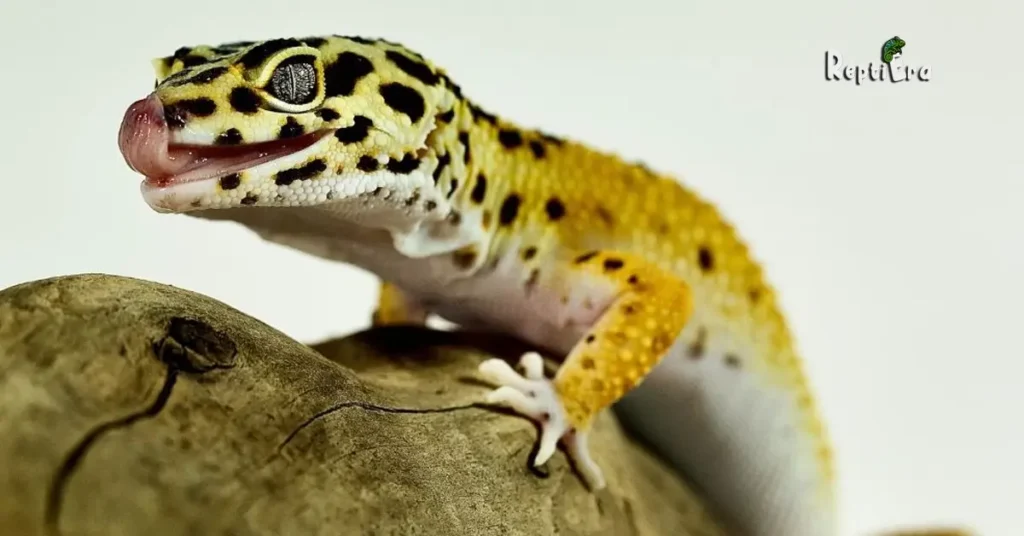
When you notice your leopard gecko licking areas around its face or vent, it’s important to understand that these are clean animals and engage in this behaviour for various reasons. One of the primary reasons a leopard gecko licks its vent is for general cleaning, especially after defecating or when marking territory.
Leos produce territorial secretions around their vent area, and licking helps to maintain hygiene. However, licking the vent can also be a sign of concern, particularly if it’s related to impaction, a common health problem in geckos. If impaction is untreated, it can lead to swollen areas and inflammation around the vent.
Pay attention to your gecko’s food intake and bowel movements. If your gecko lacks appetite, is straining to poop, or the vent area appears swollen, it’s time to intervene. Soaking in warm water can alleviate pressure and soften stool, aiding in pooping. Handle your gecko carefully during bathing, and avoid sudden movements to prevent tail drop.
In cases where impaction becomes life-threatening or if a female gecko becomes egg-bound (where Egg-binding is a serious and potentially fatal issue), immediate veterinary care is crucial.
Related Post: WHY IS MY LEOPARD GECKO LICKING HIS BUM
It Isn’t a Display of Affection
It’s easy for humans to equate a pet licking them with affection, much like we see with dogs that make their feelings known through such actions. However, when a leopard gecko is communicating, it’s not necessarily a sign of love. Unlike dogs, geckos do not exhibit social behaviours in their interactions with owners. They are not inherently social animals like primates, which derive a type of satisfaction from social interactions.
In fact, forcing these interactions can cause stress in geckos. Research supports the idea that reptiles may not form emotional bonds with human beings in the same way mammals do. The debate actively rages among reptile owners, but it’s important not to discourage building a unique bond with your gecko, whose irresistible charm is different from other pets.
The proverbial jury is still out on whether leopard geckos can feel adoration for their owners, but they can learn to associate with positive experiences such as food and safety. This association may not be affection in the human sense, but it’s a significant part of their interaction with their environment. As owners, it’s important to understand and respect the unique ways our reptilian friends communicate and bond with us, acknowledging that their ways of expressing comfort and familiarity might be vastly different from our own.
Licking is Not a Request for Attention
Some people claim that when a leopard gecko licks an owner’s hand or arm, it’s expressing a desire to be picked up or seeking attention. However, this is largely untrue. Geckos do not seek out humans in the way pets like dogs or cats might, reacting to being called by name or expecting affection. Instead, if they find insects in short supply, they may discriminate less in their quest for food, prodding with their tongue to explore their surroundings.
When handling your reptile companion, remember that your hands and arms are often the closest parts of you they can interact with within their environment. Different smells on your leg or shoulder might attract them, but it’s not a request to be held. More likely, they elect to use you as a human ramp for higher ground in their crawled-on quest for food, which is more about exploration than a desire for affection or attention.
Also Read: WHY IS MY LEOPARD GECKO DIGGING?
Should I Ever Be Concerned About My Gecko’s Licking?
When your leopard gecko is occasionally licking you, other geckos, or its environment, it’s generally normal and not a cause for alarm. There are plenty of instances where geckos lick their own eyes, nose, mouth, or vent as part of their regular grooming process. However, there are times when this behaviour could be a sign of something more serious.
To determine this, there are a few follow-up questions to ask yourself: Is the behaviour worriedly obsessive or repetitive in nature? Is your gecko constantly focusing on one part of its body, like licking one eye more than usual or nonstop at an area that may seem irritated or injured? Any abnormal way in which these actions are carried out should be noted.
Lastly, if this licking is accompanied by other troubling behaviours, like a refusal to eat, or if your gecko won’t come out of hiding for an extended period, it could indicate a health concern that needs attention. In such a case, a consultation with an exotic vet is recommended. They can provide specific insights and care for your gecko, ensuring its health and well-being are maintained.
FAQs
Why does my leopard gecko lick me?
Leopard geckos lick to gather information about their environment, collecting scent particles with their tongues and depositing them on the special sensory organ, Jacobson’s Organ, on the roof of their mouth; each lick helps them learn if a smell is different from the usual.
Is it safe to kiss your leopard gecko?
It’s important to supervise children to ensure they don’t put their leopard gecko or objects in contact with it near their mouths, and always wash hands thoroughly with soap and water immediately after handling the pet before you kiss it.
Can leopard geckos trust you?
The obvious optimistic behaviour, like building up to comfortably pick up your leopard gecko, is a good sign of trust and respect, showing you properly sense the right timing in your interactions with them.
Do geckos know their owner?
Leopard geckos can become attached and recognize the scent of their owners, especially if they’ve owned the gecko for a long time; they may even react if you’re around wearing a new cologne or fragrance.
Conclusion
When a leopard gecko starts licking you, it’s a normal behaviour and a way for them to get to know and understand their environment better. This is no cause for alarm, but it’s wise to monitor their other behaviour closely. If your gecko is experiencing stress, instances of odd behaviour may occur. In such cases, these issues should be addressed with a consultation from a professional. Remember to have fun with your gecko and enjoy the process of bonding with them, allowing them to become comfortable with you and their surroundings.
